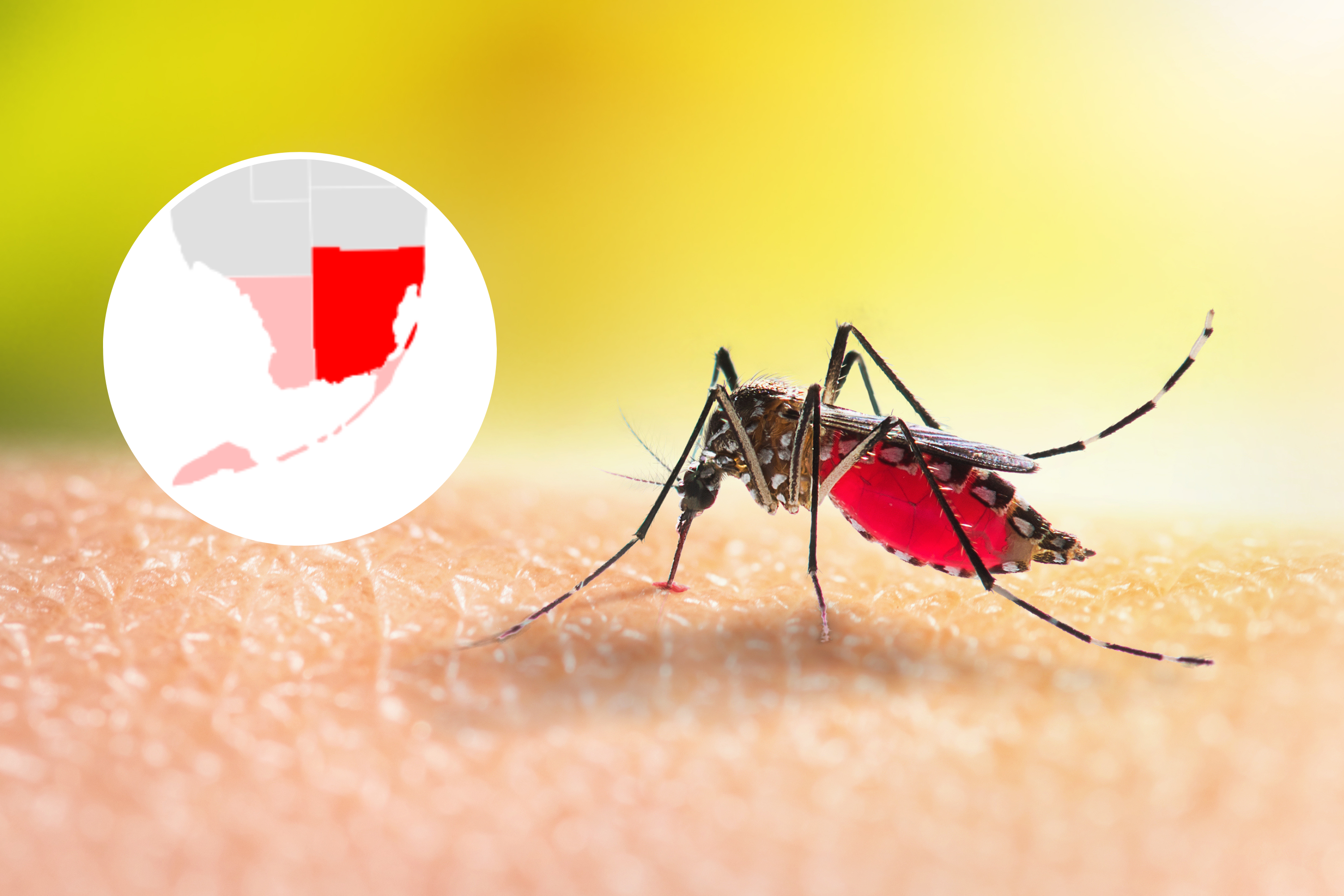Rare knowledge
Newsweek is committed to challenging conventional wisdom, seeking common ground and finding connections.


Florida health officials have issued a mosquito alert in the Florida Keys after two locally transmitted cases of dengue fever were confirmed.
This warning is National Health Advisory from the Centers for Disease Control and Prevention (CDC), warned health care workers and the public about an increase in dengue cases in the Americas.
Dengue fever is a viral infection spread by mosquitoes. According to the World Health Organization, the virus is thought to infect up to 400 million people each year, causing as many as 40,000 deaths annually. The disease is characterised by high fever, often accompanied by pain, nausea and vomiting, and symptoms can range from mild to severe (though they usually only last for two to seven days).
Only about one in four people infected with dengue actually get sick, and symptoms tend to appear within two weeks of being bitten.
The disease occurs primarily in tropical and subtropical climates, but historically localized transmission has also been reported in Florida, Texas, Arizona, and California.
At the end of June, two locally transmitted cases of dengue were confirmed in Monroe County, bringing the total number of locally transmitted cases in Florida since the beginning of 2024 to 10. So what other counties have locally transmitted cases of dengue confirmed?

Miami-Dade County has had the highest number of local cases this year with two in January, one in February, two in March and one in April. Hillsborough and Pasco counties also saw one case each in June and January, respectively.
While the number of cases is still very low, the Monroe County Health Department and the Florida Keys Mosquito Control District are coordinating surveillance and prevention efforts to limit the spread of infection in the area, including door-to-door surveillance and, when necessary, targeted insecticide spraying from trucks and the air.
The Florida Department of Health also recommends the following measures to protect yourself from mosquitoes:
Do you have a health concern? Let us know at [email protected] so we can seek expert advice and feature your story. Newsweek.
Newsweek is committed to challenging conventional wisdom, seeking common ground and finding connections.
Newsweek is committed to challenging conventional wisdom, seeking common ground and finding connections.
|
Sources 2/ https://www.newsweek.com/map-floridadengue-cases-health-warning-1921302 The mention sources can contact us to remove/changing this article |
What Are The Main Benefits Of Comparing Car Insurance Quotes Online
LOS ANGELES, CA / ACCESSWIRE / June 24, 2020, / Compare-autoinsurance.Org has launched a new blog post that presents the main benefits of comparing multiple car insurance quotes. For more info and free online quotes, please visit https://compare-autoinsurance.Org/the-advantages-of-comparing-prices-with-car-insurance-quotes-online/ The modern society has numerous technological advantages. One important advantage is the speed at which information is sent and received. With the help of the internet, the shopping habits of many persons have drastically changed. The car insurance industry hasn't remained untouched by these changes. On the internet, drivers can compare insurance prices and find out which sellers have the best offers. View photos The advantages of comparing online car insurance quotes are the following: Online quotes can be obtained from anywhere and at any time. Unlike physical insurance agencies, websites don't have a specific schedule and they are available at any time. Drivers that have busy working schedules, can compare quotes from anywhere and at any time, even at midnight. Multiple choices. Almost all insurance providers, no matter if they are well-known brands or just local insurers, have an online presence. Online quotes will allow policyholders the chance to discover multiple insurance companies and check their prices. Drivers are no longer required to get quotes from just a few known insurance companies. Also, local and regional insurers can provide lower insurance rates for the same services. Accurate insurance estimates. Online quotes can only be accurate if the customers provide accurate and real info about their car models and driving history. Lying about past driving incidents can make the price estimates to be lower, but when dealing with an insurance company lying to them is useless. Usually, insurance companies will do research about a potential customer before granting him coverage. Online quotes can be sorted easily. Although drivers are recommended to not choose a policy just based on its price, drivers can easily sort quotes by insurance price. Using brokerage websites will allow drivers to get quotes from multiple insurers, thus making the comparison faster and easier. For additional info, money-saving tips, and free car insurance quotes, visit https://compare-autoinsurance.Org/ Compare-autoinsurance.Org is an online provider of life, home, health, and auto insurance quotes. This website is unique because it does not simply stick to one kind of insurance provider, but brings the clients the best deals from many different online insurance carriers. In this way, clients have access to offers from multiple carriers all in one place: this website. On this site, customers have access to quotes for insurance plans from various agencies, such as local or nationwide agencies, brand names insurance companies, etc. "Online quotes can easily help drivers obtain better car insurance deals. All they have to do is to complete an online form with accurate and real info, then compare prices", said Russell Rabichev, Marketing Director of Internet Marketing Company. CONTACT: Company Name: Internet Marketing CompanyPerson for contact Name: Gurgu CPhone Number: (818) 359-3898Email: [email protected]: https://compare-autoinsurance.Org/ SOURCE: Compare-autoinsurance.Org View source version on accesswire.Com:https://www.Accesswire.Com/595055/What-Are-The-Main-Benefits-Of-Comparing-Car-Insurance-Quotes-Online View photos
to request, modification Contact us at Here or [email protected]